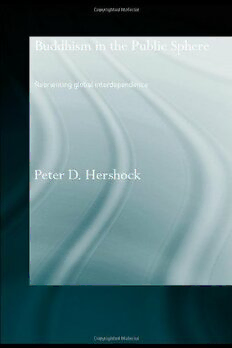
Buddhism in the Public Sphere: Reorienting Global Interdependence (Routledge Critical Studies in Buddhism) PDF
241 Pages·2006·1.18 MB·English
Most books are stored in the elastic cloud where traffic is expensive. For this reason, we have a limit on daily download.
Preview Buddhism in the Public Sphere: Reorienting Global Interdependence (Routledge Critical Studies in Buddhism)
Description:
The core teachings and practices of Buddhism are systematically directed toward developing keen and caring insight into the relational or interdependent nature of all things. Hershock applies Buddhist thought to reflect on the challenges to public good, created by emerging social, economic, and political realities associated with increasingly complex global interdependence. In eight chapters, the key arenas for public policy are addressed: the environment, health, media, trade and development, the interplay of politics and religion, international relations, terror and security, and education. Each chapter explains how a specific issue area has come to be shaped by complex interdependence and offers specific insights into directing the growing interdependence toward greater equity, sustainability, and freedom. Thereby, a sustained meditation on the meaning and means of realizing public good is put forward, which results in a solid Buddhist conception of diversity. Hershock argues that concepts of Karma and emptiness are relevant across the full spectrum of policy domains and that Buddhist concepts become increasingly forceful as concerns shift from the local to the global. A remarkable book on this fascinating religion, Buddhism in the Public Sphere will be of interest to scholars and students in Buddhist studies and Asian religion in general.
See more
The list of books you might like
Most books are stored in the elastic cloud where traffic is expensive. For this reason, we have a limit on daily download.
